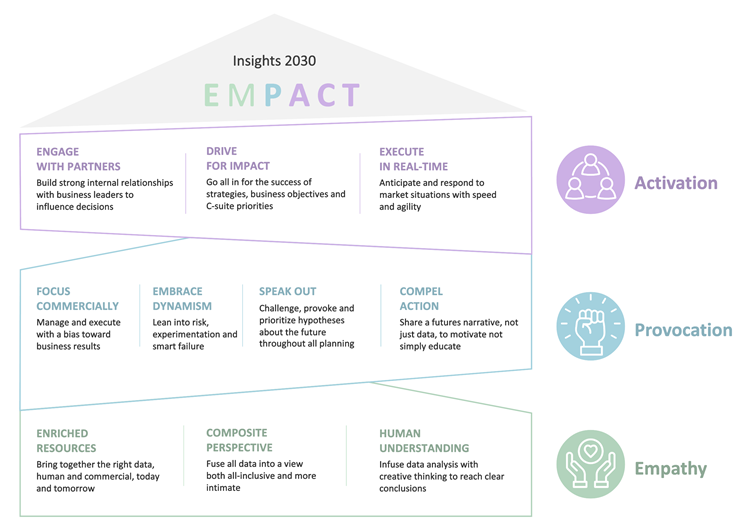Provocation Makes the Difference
Insights leaders can no longer sit back and merely inform. They must provoke. Insights teams must be agents of provocation.
In other words, the job of insights leaders is more than understanding consumers. Insights leaders must offer clear, specific and tangible recommendations for business, brand and category. Insights leaders must look to the world beyond consumer data for a thorough-going view of opportunities and risks, and then bring this to bear in ways that provoke business leaders to action. Provocation makes the difference.
This is one of the critical learnings from Kantar’s industry-leading research into the future of insights, Insights 2030, or I2030. Insights teams at leading companies speak up and speak out. Provocation is how leading-edge insights leaders operate, particularly with a bias towards commercial business impact. They challenge business as usual. They motivate not just educate. They are provocateurs not just advisors.
Being provocative requires a culture of experimentation and a willingness to fail as part of finding success. It thrives when insights leaders can dissent with a credible voice, which means building trust and relationships. Provocation entails a narrative of action that begins with but does not end with data.
The House of Insights framework from I2030, shown here, shows the importance of provocation as the channel by which empathy is activated. Provocation is a four-fold portfolio of skills and processes that insights teams use to channel empathy into the company as a whole. With AI now streamlining processes and enhancing knowledge skills, as discussed in the first post of this series about the impact of AI on the future of insights—a future we call AI 2030—provocation will transform as well.

Brands will succeed to the extent that they bring AI into the provocative flow of data into decisions. The formula for success is roughly something like this: High-quality information filtered by AI and executed with agility equals success. In other words, not merely data to decisions. Rather, well-curated data that is then transformed by AI into superior provocations that can propel brands forward faster and farther.
Insights teams should be benchmarked against their ability to leverage AI in this way. Such an organizational benchmarking of skills and processes is what Kantar offers insights leaders.
AI as Provocation
Insights must stir things up. Not to be disruptive, but to kindle better conversations leading to smarter outcomes. AI will enable insights teams to do this at speed and at scale. Use cases are bearing this out.
Experimentation. The secret to good testing is not the process but the inputs. What you test more than how you test it. AI will speed up turnaround significantly. But without better things to test, AI will only iterate failure faster. However, AI can also iterate better. AI can plumb huge databases and extensive experience with a wider range of consideration to generate a wealth of new combinations. Many of these are unhelpful, but several are always novel and intriguing. These will push boundaries in provocative ways and bring counter-intuitive yet promising new alternatives to the table.
In this vein, it’s worth underlining the importance of data integrity. Ensuring this will be the responsibility of humans alone. With fraud as a growing challenge for research and media, data quality has become a paramount issue. With concerns about privacy also rising, many companies have restricted use of AI to their own data. Yet, this solution has limitations of its own. Figuring out a provocative reckoning of these pros and cons is a priority facing insights leaders. Fortunately, AI can help by determining if input data are up to iterative experimentation, and if not, identifying what data or data improvements are needed.
Summarization. Generative AI has proven its ability to pull together a vast body of original source material. This is indispensable to provocation. Only a greater breadth of knowledge can challenge convention and routine—for example, distilling the similarities of successful campaigns or compiling a fact book of information from all sources about a target group or geography. As data are being collected, AI can summarize quickly and efficiently, providing the opportunity to apply key learnings immediately, including critical takeaways in real-time.
The risks of hallucinating fictional summaries will be better managed as algorithms evolve from probabilistic to deterministic outcomes.
Implications. Just knowing more is never enough, but too often that is all that insights teams deliver. Extracting implications is hard. It is a certain way of thinking that involves going beyond the comfort zone of data. Frequently, it turns on experience or uncomfortable connections. None of which comes easily, but AI operates with none of these hesitations.
Big ideas often mean starting from a blank sheet of paper, which stalls out many insights teams. It is always easier to work from a starting point than to originate the starting point. AI may not come up with the final implications, but AI can always come up with rich, provocative starting points.
Solutions. Many great marketing ideas have been stymied by implementation. Such as processing individual data to customize a personal fit. AI will leapfrog such difficulties.
For many applications, AI will provide the platform for personalization. As well as for customer service, media buying, digital communications and more. With these solutions in hand, insights will have fresh opportunities to re-ask settled questions and rekindle old conversations in new, provocative ways.
Scenarios. A critical job of insights teams, and a key part of provocation, is to expand the horizons of senior decision-makers. By getting them to think more in terms of disruptions and less in terms of extrapolation. The past is not always the best predictor of the future, especially not in this moment of uncertainty and volatility. Instead, decision-makers need to understand possibilities or scenarios.
Generative AI is especially good at assuming a persona, applying a certain style of expression or mimicking a type of thinking, thus equipping insights teams with more provocative scenarios for senior leaders. One way to say it is that AI for insights should be read as agitation intelligence not artificial.
AI 2030 and Provocation
AI 2030 points to four AI-related things to benchmark, one for each of the competencies of provocation.
- Focus commercially. How well insights teams think in terms of the business not just research.
- For example: Prompts. Insights teams must become prompt engineers for the business. We have seen that asking AI why something failed is more provocative than asking why it succeeded. Prompt skills will be as important as writing questions was in the past.
- Embrace dynamism: How well insights teams immerse themselves in uncertainties.
- For example: Scenarios. Planning for alternative outcomes increases a brand’s robustness. For one client, a global pandemic was not a likely outcome but recognizing it as a possibility put it in a position to grow during 2020 even as others declined.
- Speak out: How well insights teams plumb the fact base that AI has made available to all.
- For example: Patterns. We have seen that the kind of conceptual thinking required to open a wider vista of ideas can be hard for insights teams that are trained to focus mostly on details and particulars. The forest goes unseen for the trees. AI can bring patterns to light, many of which will be coincidental, of course, but some of which will be breakout ways of reconfiguring a brand or category.
- Compel action: How well insights teams communicate empathy in ways that provoke actions.
- For example: Narratives. AI might not be the best storyteller, but AI is better than most, and AI systems are continuously improving their ability to narrate a straightforward and informative story. At the very least, AI can produce a better first draft for insights teams to polish for provocation.
The overarching benchmarking question is whether AI is enabling insights professionals to be more provocative. Those are the processes and skills that insights teams want to benchmark for the future of insights in an era of AI.


